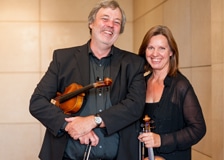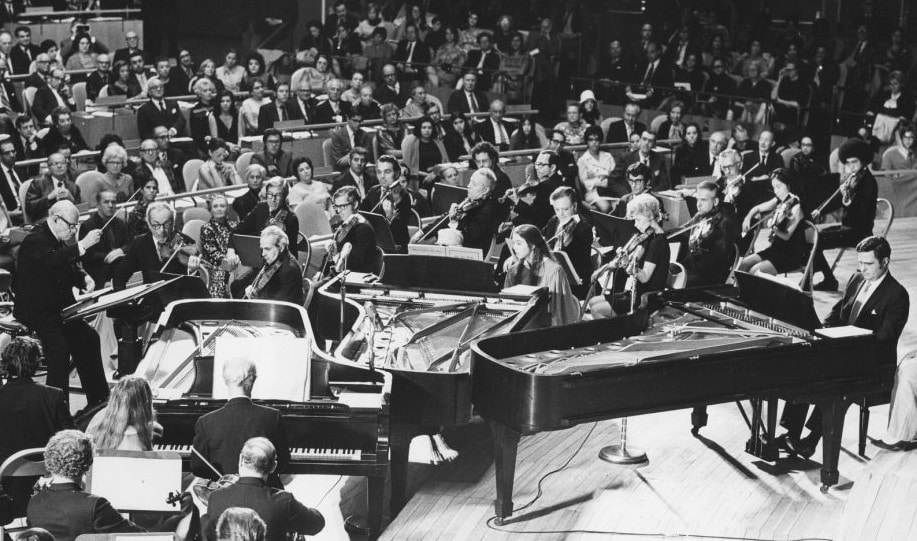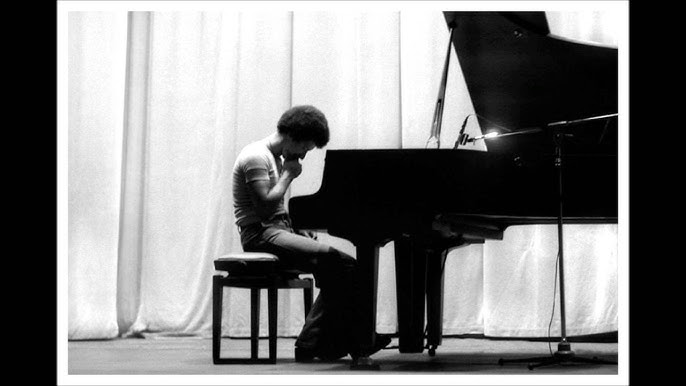Scotland loses leader
mainThe Royal Scottish National Orchestra (RSNO) has announced that its co-leader, James Clark, is leaving next week. He has been in the job for five years and is finding the commute to his other job in Liverpool, where his family lives, a bit too arduous.
James says: ‘I have fond memories of working with my colleagues at the RSNO and have hugely enjoyed the times we’ve worked together – it’s an ensemble with a strong artistic identity and dynamic quality and I’m proud to have played a part in its continuing development.’

media release:
James Clark will step down from the Royal Scottish National Orchestra (RSNO) later this month after five years as co-leader. James, who is also co-leader of the Royal Liverpool Philharmonic Orchestra, is based in Merseyside, and aims to spend more time with his family as well as concentrate more of his time on performing chamber music.
James Clark’s final appearances as RSNO Leader will be accompanying Ballett am Rhein at the Edinburgh Playhouse, where the Düsseldorf-based ballet company performs Seven, choreographer Martin Schläpfer’s full ballet response to Mahler’s Symphony No7.
Clark became a well-known figure at the front desk of the first violins as guest Leader following the retirement of Edwin Paling in 2007. In 2010 he was appointed to the specially-created position of Principal Guest Leader, and in 2011 accepted the permanent joint leadershipalongside Maya Iwabuchi. In August 2011 Clark won a Herald Angel Award, recognising his outstanding performances at that year’s Edinburgh International Festival.
RSNO Leader James Clark: “I have fond memories of working with my colleagues at the RSNO and have hugely enjoyed the times we’ve worked together – it’s an ensemble with a strong artistic identity and dynamic quality and I’m proud to have played a part in its continuing development.
“Particular highlights for me have been recording and performing American music with Music Director Peter Oundjian, recording and performing the orchestral works of Debussy with Stéphane Denève, our appearances at the Edinburgh International Festival, touring across Scotland – including a wonderful week-long residency in Shetland, where we collaborated with local musicians, and at the St Magnus Festival in Orkney – and performing at the BBC Proms at the Albert Hall.”
RSNO Music Director Peter Oundjian: “Working alongside James has been an absolute pleasure. His talent as a top-flight orchestral musician cannot be questioned, but our shared background as quartet players has made these years of shared music making particularly meaningful. He leaves with us a legacy of an ensemble in great shape, and we would all like to wish him the very best for the future.”
The RSNO will be inviting guest leaders to join the musicians while the search for a successor to James Clark is undertaken.





No mention of the fact that for many years he was also Concert Master of the Philharmonia Orchestra, having previously been a rank-and-file player there.
He also led what was then called the BBC Welsh Symphony Orchestra when Tadaaki Otaka was in charge and Maris Jansons was principal guest.
Hmmm… errr…. If I may ‘interlope’ briefly into all this fawning adulation…?
No mention of the fact that for many years Mr James Clark was Leader (‘Concertmaster’ if we must) of the Scottish Chamber Orchestra in the 1990s, where he quickly acquired a reputation for ‘shooting conductors down in flames’, especially the ones with whom he disagreed musically.
In the mid-to-late 1990s I was a ‘junior production assistant’ for an internationally renowned ‘budget CD label’, and I personally witnessed (via hearing over the microphones) some astonishingly bitter, acrimonious and downright peevish exchanges between Mr Clark and the harpsichord/ director/ conductor of a series of 12 rather boring 18th century Cello Concertos.
At the time, this was very embarrassing, not only to the excellent cello soloist but also to the entire orchestra and of course the overall music producer, the ‘legendary’ Paul Myers of CBS/Szell/ Cleveland Orchestra fame.
My ‘spies in the profession’ tell me that only EIGHT of those 12 Concertos were ever released on CD, the final 4 having to be ‘binned’ primarily because of the disputes between Mr Clark and the conductor (and maybe the soloist) over various matters of Tempo, Articulation, Dynamics, Phrasing, etc.
In the end, the CD company had to hire a different soloist, orchestra and conductor in order to complete the project with the final four Concertos.
Well done Mr Concertmaster!
Jim has a very distinguished career, both as an orchestral player and a chamber musician, so they could hardly have mentioned everything, but I’m really glad we are not losing him from the Liverpool Phil! Commiserations to the RSNO. See Jim’s website for details of his career: http://www.jamesaclark.co.uk/James_Clark.html
Incidentally, isn’t ‘rank and file’ a little old-fashioned (Alexander Hall)? ‘Tutti’?
I’m sorry but I am not a slave to political correctness and the deliberate obfuscation which has also invaded the world of classical music. A spade is a spade is a spade, as Gertrude Stein might have said.
there was one little ‘spat’ in particular that was ‘clocked’ in the production office by both Paul Myers and myself:
The conductor requested the orchestra to make a FORTE ( loud) downbeat in one of the pieces; Mr Clark objected; the conductor, undeterred repeated his request :Mr Clark turned to the violin section and said ” play FORTE there EVEN IF YOU DON’T AGREE WITH THE CONDUCTOR”
Well well this was really ‘heart warming’ because the ‘old tradition’ of the conductor being a ‘go-between’ and actually HELPING the conductor was finally being ‘applied ‘ and observed!
sorry, I should have proof-read this before posting as its a bit unintelligble, what I meant to write was this:
Well well this was really ‘heart warming’ because the ‘old tradition’ of the LEADER being a ‘go-between’ and actually HELPING the conductor was finally being ‘applied ‘ and observed!
Therefore Mr James Clark actually picked up some ‘brownie points’ here as he was telling the violins to ‘do as the conductor asked’ even though he didn’t agree with it. Maybe he was – on reflection – trying to make up for his previous transgressions..?
Great leader who didn’t suffer fools (inferior conductors) lightly
This particular conductor was neither a ‘fool’ nor an ‘inferior conductor’.
Mr Clark turned to the violin section and said ” play FORTE there EVEN IF YOU DON’T AGREE WITH THE CONDUCTOR”
That’s an absolutely inadequate, non-professional and disqualifying behaviour….
The poor suffering conductor /harpsichord player in the sessions which Will mentions was Anthony Halstead. Mr H was for many years principal horn of ECO and came to conducting relatively late in his career so maybe JC thought it was a lark to bully him.
Thank you for your kind comments, Professor Dunsby.
Viewing that regrettable incident in a favourable light (and by the way, Will did indeed accurately relate what happened) at least Jim Clark requested his violin section to DO excatly what I had requested…i.e. he DIDN”T say ‘ignore the conductor’ – which is what once happened to me in another ‘national’ chamber orchestra, unfortunately!